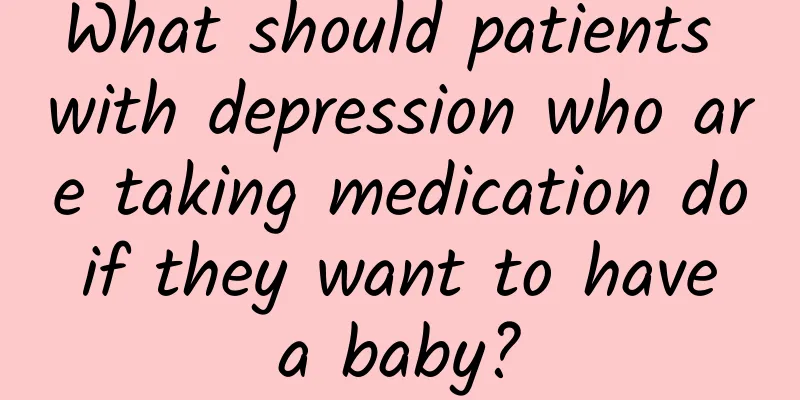What should patients with depression who are taking medication do if they want to have a baby?

|
This is the 4583rd article of Da Yi Xiao Hu One day, a young couple came into the clinic. The patient, Zhang, female, 28 years old, had a history of depression for more than a year and a half. She was taking medication and her mood was stable. She was planning to get pregnant and have a baby, and wanted to stop taking medication, but was worried about her condition recurring. She was also worried about the effect of the medication on the fetus, so she felt conflicted and confused, so she came to consult. General principles of medication during pregnancy 1. Comprehensively weigh the benefits and risks of stopping and continuing medication, including disease recurrence and the effects of medication on pregnancy and the fetus. 2. Avoid using psychiatric drugs in the first three months of pregnancy. This is the period of organ formation, and the pros and cons of choosing drugs should be weighed. Psychological counseling or psychotherapy can be performed to avoid the sensitive period of teratogenicity. 3. If medication is necessary, use the lowest maintenance dose, carefully monitor adverse reactions, and conduct pregnancy checkups. 4. Avoid the combined use of multiple drugs, as the synergistic use of multiple drugs may cause teratogenesis. 5. The dosage should be reduced or the drug should be stopped as much as possible in the late pregnancy to avoid withdrawal syndrome and withdrawal symptoms in the newborn. From the perspective of eugenics, patients with depression should stop taking medication before, during, and during breastfeeding to avoid adverse effects of medication on sperm, eggs, fetuses, and newborns. However, in clinical practice, many patients with depression should not stop taking medication, or their depression relapses or their original symptoms worsen after they stop taking medication, and they must resume medication treatment, which often leads to many contradictions. How to weigh the pros and cons and make decisions can follow the following principles: 1. Try to avoid the effects of drugs on the fetus Although there is still a lack of conclusive evidence of the teratogenic effects of antidepressants, in principle, pregnant women should not take antidepressants. Some people even suggest that pregnant women should wait for six months after stopping taking the drugs to avoid adverse effects on sperm and egg development. Drugs should not be used in the first three months of pregnancy because the early development of the fetus is easily disturbed by adverse factors in the environment. If medication is necessary, be careful to choose drugs with the least toxic side effects on the fetus. 2. Adhere to the safety of pregnant and postpartum women as the premise For women with depressive disorders, if their depressive symptoms worsen significantly during pregnancy and clearly endanger their mental and physical health, or even put them at risk of suicide, they should resume systematic treatment in a timely manner regardless of the stage of pregnancy. 3. The choice and dosage of drugs should take into account the safety of the fetus or infant. Most drugs are generally metabolized by the liver before being excreted from the body, but the liver of a fetus or infant is very incompletely developed. Therefore, not only should drugs that are liver toxic not be used, but drugs that are mainly metabolized by the liver should also be used with caution or not at all. 4. Those who take medication during breastfeeding can switch to artificial feeding to raise their babies Do not think that the drug concentration in breast milk is much lower than that in blood, so you can ignore the effect of drugs on babies. Modern children have very good artificial feeding conditions. Artificial feeding will not affect the child's development and allow mothers to take medicine with confidence. It is recommended that patients with depression take medication before pregnancy, during pregnancy, and during breastfeeding before making a decision after evaluation at the hospital. If medication is required, please take it under the guidance of a doctor and seek medical attention in a timely manner if you feel unwell. References: 1. Li Lingjiang, Ma Xin. Guidelines for the prevention and treatment of depressive disorders in China. 2nd edition. Beijing: Chinese Medical Electronic Audio-visual Publishing House. 2. Liu Shanshan. Standardized manual for medication consultation for depression. Beijing: People's Medical Publishing House. Author: Shanghai Fengxian District Mental Health Center Psychiatry Department Attending Physician Wang Chunlian Wang Jinde Attending Physician |
<<: Will taking calcium tablets cause "bone spurs"?
>>: “Being slim in old age is priceless”, can being thinner really help you live longer?
Recommend
Can I eat cold food if I have cervical erosion?
In summer, everyone likes to eat some cold food. ...
Drinking alcohol frequently harms these two organs! It is healthier to not drink at all
We are used to expressing our feelings and having...
What should I do if I have vaginal odor?
What should you do if there is an odor in your va...
Why is Orange Island called Orange Island? What are the characteristics of Orange Island?
Orange Island is the largest inland lake in China...
What causes Gardnerella?
Vaginitis is caused by different reasons, so it c...
Breastfeeding
During the breastfeeding process, many various pr...
Will the birth be delayed if the placenta is grade 1 at 38 weeks of pregnancy?
At 38 weeks of pregnancy, the placenta is still t...
How to cook the pickled pepper pork skin (it takes about two hours to cook the pig skin completely)
...
“If you have a tumor, does that mean you have cancer?”, “Is the occurrence of cancer related to bad living habits?” Here comes the truth!
gossip The International Union Against Cancer has...
Eight secrets of women that men don't know
A woman's heart is as unfathomable as the sea...
World Suicide Prevention Day | A child cuts his hand and says he doesn't want to live anymore. Is this a threat or a request for help?
Author: Qian Hong: Doctor of Medicine, Attending ...
Dragon Boat Festival is here, and the fragrance of zongzi is everywhere! Zongzi is delicious, but here are 4 things to pay attention to!
The Dragon Boat Festival is coming soon. In addit...
Treatment of acute salpingo-oophoritis
In life, we always hear this sentence, that is, l...
2020 Qing Palace List
2020 is coming soon, and I believe that many frie...
Is it necessary to have a hysterectomy for uterine fibroids?
Having uterine fibroids is already very unfortuna...









